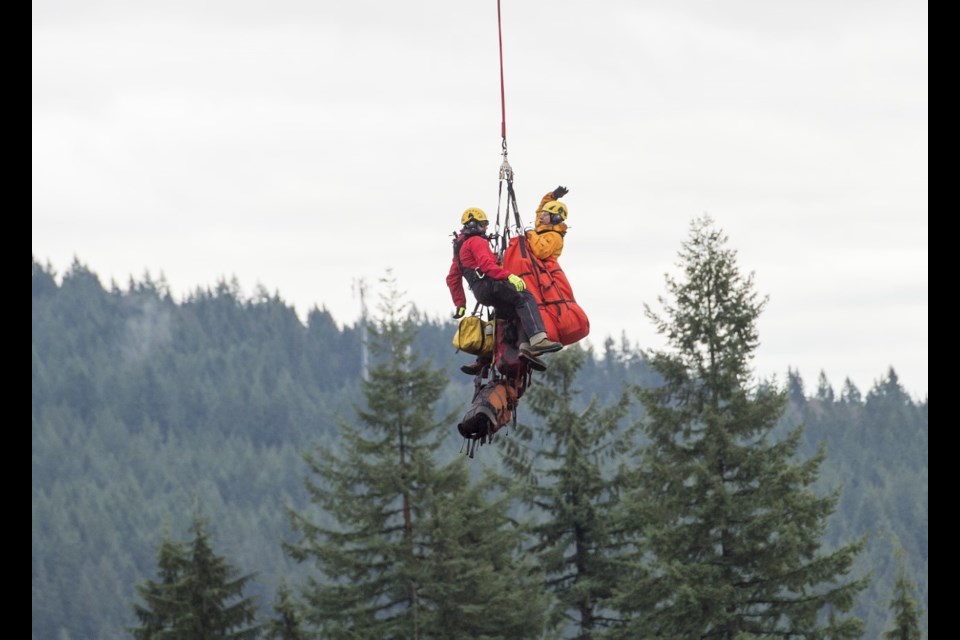When Cathalynn Labonte-Smith retired to Gibsons in 2019 and her husband joined the Sunshine Coast Search and Rescue (SAR), she took notice of the activities and outreach of the volunteer group.
The team members could be called out at any time — no matter what the geography or weather conditions — to save a local’s life or assist in a mutual aid with another SAR anywhere in the province.
A former teacher and author, Labonte-Smith followed husband’s training, and used her skills to study what SAR teams did and to learn about their culture as first responders.
She also spoke with lead SAR volunteers throughout North America about some high-profile cases they were involved with, as well as survivors and families of people recovered from fatal accidents.
During the COVID-19 pandemic, she wrote about their stories for a new book that was released in Canada last October, and will be out in the United States on April 7.
Published by Caitlin Press, Rescue Me: Memoirs of Search and Rescue tells the incredible true tales of people getting lost on mountains and highways, in caves and while picking mushrooms in the forest — and the SAR volunteers who plucked them to safety.
Among the cases that Labonte-Smith included was a Coquitlam SAR incident that gained international attention.
In November 2017, Coquitlam’s Annette Poitras, then 56, was walking three dogs on Eagle Mountain when she disappeared.
Coquitlam SAR — plus about 100 members from other B.C. SAR teams and RCMP — found her two days later and airlifted her via helicopter to the Westwood Plateau Golf Course, where her husband, Marcel, was waiting; she was rushed to hospital for immediate care.
On Jan. 14, the pair will be at the Coquitlam Public Library: Labonte-Smith, to publicize her new book and provide education about SAR with her husband, Steve, a certified Adventure Smart educator with BC SAR; and Poitras, to deliver a slide show about her ordeal (in 2018, she also published a book, called Three Dog Nights: The Search and Rescue of Annette Poitras, about being missing in the backcountry).
Research and writing
Labonte-Smith, who splits her time between Gibsons and North Vancouver, said she started her writing project by contacting all SAR teams in Canada and the U.S.
She told them her aim was to raise the profile of SARs by sharing some of their experiences and educating the public about their often-dangerous calls.
In total, Labonte-Smith gathered about 100 cases, of which 69 are printed in her new book; the remainder, and some new cases, will be published in a second SAR work due out next year.
Labonte-Smith also dove into archives and newspaper records, spoke with survivors who had been rescued and, for families whose loved ones died, she sought permission and their blessings to include their stories.
“Most of the people I contacted were happy that their relative was going to be remembered,” she said.
But rather than dividing her chapters according to locations, Labonte-Smith chose to organize her table of contents according to incidents — that is, missions involving avalanches, plane crashes and dives, etc.
There’s also a section about people still missing.
Labonte-Smith also pointed out the difference between Canadian and American SAR funding and support systems.
In the U.S., SAR teams must pay for their own membership, training, equipment and insurance, as well as fundraise; they are deployed by the sheriff’s office and, depending on where they are, the missing person must pay for their rescue.
In Canada, by comparison, there is no cost for either the SAR volunteer or the person rescued. And there is emotional help for the SAR members in Canada, she said, noting some American counterparts she interviewed had never talked about their experience and some suffered from PTSD.
Poitras responds
Annette and Marcel Poitras told the Tri-City News that Labonte-Smith’s publication highlights the good work of the SAR teams.
“Rescue Me is an interesting book of short stories about search and rescues that have happened in our area and beyond,” they wrote in an email on Jan. 6.
“These stories are easy to read and give a very good idea of how SAR works, when it’s needed and what the SAR members go through. Please support your local SAR by first taking care of yourself, so that they are not needed, and financially so that they are there when you or someone you love does.”
Registration is now open to hear Labonte-Smith and Poitras on Jan. 14 at the City Centre branch of the Coquitlam Public Library (1169 Pinetree Way). The event in rooms 136 and 137 is from 2 to 4 p.m.
For more information and to register, you can visit the library's website.
To donate to the Coquitlam SAR, which is marking its 50th year with president Helena Michelis at the helm, visit the non-profit's website.



